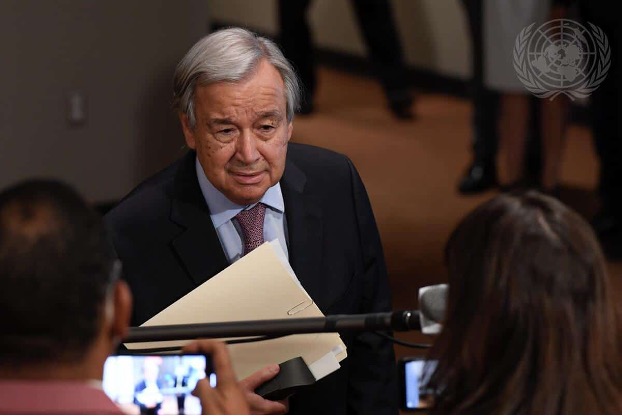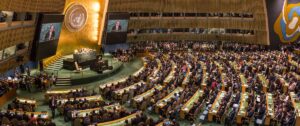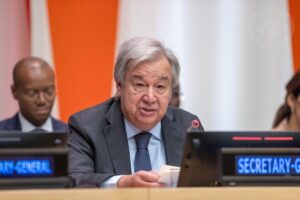A year ago, as Covid-19 took its toll on countless lives and livelihoods and presented yet another reminder of how global crises inevitably require global cooperation and solutions, world leaders convened virtually to endorse a declaration marking the United Nations’ 75th anniversary. To achieve progress on the declaration’s 12 commitments, member states requested Secretary-General António Guterres “to report back” before the end of the 75th session of the General Assembly “with recommendations to advance our common agenda and to respond to current and future challenges.”
At the heart of the report is the idea of trust and solidarity as the fiber holding together society from the local to the global level — a fiber that is fast unraveling. Hence, the report proposes nothing less than a new social contract between governments and governed. According to “Our Common Agenda,” such a contract is not an abstract term but includes, among other things, “the active and equal participation of women,” universal social protection, health coverage and universal Internet access as a “basic human right.”
To complement the social contract, the report calls for a new global deal to enhance the governance of the global commons and global public goods. While this is vital, as we argue in the “Beyond UN75” report, a new global deal should put to use a new social contract, including through global, regional, national and community-level plans for broad-based, green recovery from the pandemic and related policies, programs and funding.
Institutionally, the report must be praised for its various suggestions to create a United Nations 2.0 (for which we have further ideas in our report “UN 2.0: Ten Innovations for Global Governance 75 Years beyond San Francisco”). For instance, “Our Common Agenda” links the overdue repurposing of the Trusteeship Council, which has been inactive since 1994, to the bold proposal of turning it into a “multi-stakeholder body to tackle emerging challenges and, especially, to serve as a deliberative forum to act on behalf of succeeding generations.”
In reforming the global economy, the proposal for a biennial summit among the members of the G20, ECOSOC (the UN’s Economic and Social Council), the secretary-general and the heads of the international financial institutions is equally welcome. However, even here one could go a step further and, as we proposed recently, assemble a G20+ “at the Heads of State level every two years at UN Headquarters, timed to coincide with the gathering of all world leaders at the start of the UN General Assembly.”
A 2023 Summit of the Future
Together, the above and other far-reaching ideas — and the analysis underpinning them — create the basis for what may be viewed as the secretary-general’s most consequential proposal: a Summit of the Future, timed to coincide with the General Assembly’s high-level week in September 2023. Preceded by preparatory events and consultations, the summit would work to “advance ideas for governance arrangements in the areas of international concern mentioned in this report, and potentially others. . . . “
As argued in “Beyond UN75,” the genius of such a holistic, intergovernmental process for global governance innovation is that it could generate meaningful results through deal-making across a broad agenda that brings together diverse national interests and values, thus making the summit acceptable to powerful countries, including possible spoilers. This approach can also break through longstanding impasses, perhaps even Security Council reform.
To challenge his own ideas and offer member states in their pre-summit deliberations fresh thinking on the institutional and legal arrangements that are needed to better provide global public goods, Guterres will also convene a high-level advisory board, led by former heads of state or government. Ideally, this group could engage with select government and civil society representatives, as well as leading scholars, in a series of Track 1.5, off-the-record global policy dialogues timed to precede preparatory meetings. In addition to challenging conventional assumptions and helping to reframe narratives to overcome potential spoilers, each dialogue could emphasize — based on the findings of independently commissioned policy briefs — the need for creative and actionable proposals that would hold world leaders and international institutions accountable.
A more inclusive, networked and effective system of global governance for better coping with the challenges of current and future generations while seizing new opportunities is within our reach, but time is running short. Going forward, the international community must draw strength from the representative legitimacy — but also ideas and capabilities — of diverse state and nonstate actors. Meaningful change is possible, though making headway on this global road ahead will require imagination, persistence and, most of all, courage.
Read the full op-ed in PassBlue.




